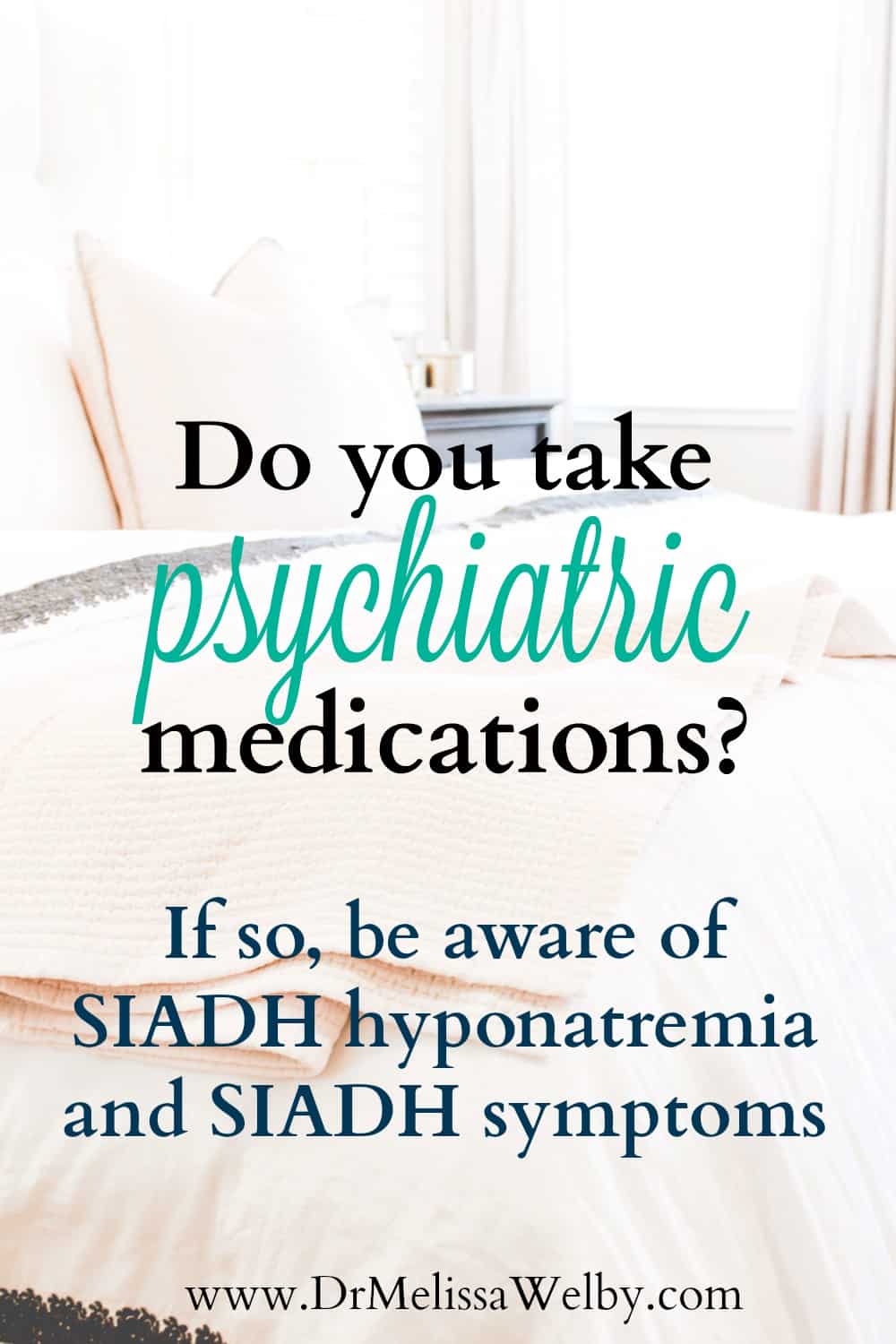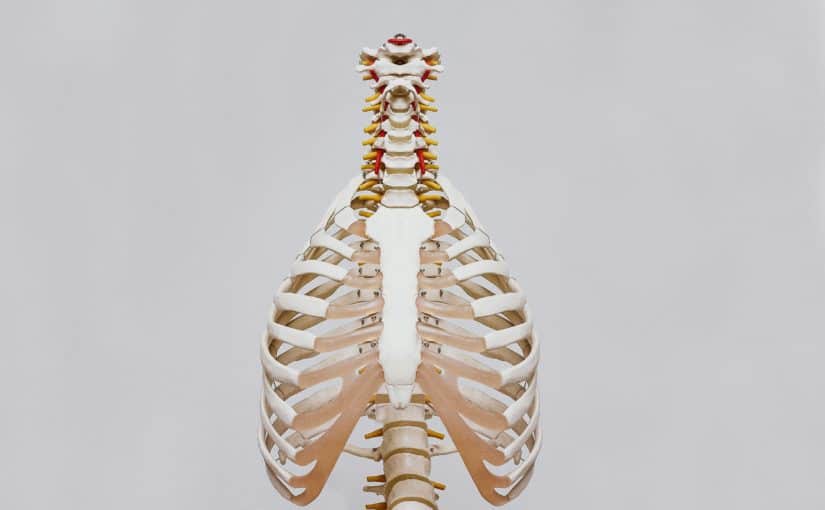Hyponatremia means a low amount of sodium in the blood. This may sound like a good thing since doctors are frequently telling people to limit salt intake, but in this case, the low sodium isn’t healthy and in fact, can be extremely dangerous. Syndrome of inappropriate antidiuretic hormone secretion (SIADH) is one of the conditions that leads to hyponatremia. SIADH symptoms can be induced by many different medications prescribed for psychiatric conditions, including antidepressants and mood-stabilizers. What is SIADH hyponatremia? Let’s review what it means, the causes of SIADH, and the details of the symptoms SIADH causes so you know what to watch for.
Tag: Psychiatric Treatment
9 Facts About the Sexual Side Effects of Antidepressants: They are common!
Sexual side effects of antidepressants are common yet often people feel too embarrassed to discuss these with their doctor. To make it more complicated, a common symptom of depression is reduced interest in sexual activity. This can then be compounded by the antidepressants sexual side effects. If you are wondering about antidepressant sexual side effects, but too afraid to ask, I am writing this post for you! Here are several facts about antidepressants and sexual side effects so you can be more informed.
Neuroleptic Malignant Syndrome: Rare but Potentially Deadly Side Effects of Antipsychotic Medications
Neuroleptic Malignant Syndrome (NMS) is a potentially life-threatening condition that is one of the rare side effects of antipsychotic medications. It is fatal in 10% of patients. Neuroleptic Malignant Syndrome symptoms need to be recognized early to cut down on this risk of death. NMS is an unpredictable and rare condition but because of the seriousness, people who take a medication classified as an antipsychotic need to know about it and realize if it is happening. Starting Neuroleptic Malignant Syndrome treatment right away will improve the course of the syndrome. What is Neuroleptic Malignant Syndrome? Follow along to find out.
Effects of Antidepressant Medications: How Do You Know if it is Working?
How will antidepressants make me feel? How do I know if it is working? Before starting antidepressant medications it’s important to know what to expect; both with potential side effects but also what to look for when assessing if there is a benefit. Antidepressant medication is slow to take effect so the benefits can creep up on the person. You will not suddenly be a different person from the effects of antidepressants (and if you are then you are likely having a side effect your physician needs to know about). Antidepressants are not “happy pills”…but will hopefully treat depression so that you can get back to your normal self.
26 Symptoms of Adult ADHD: Can You Relate?

Although each person is unique, there are many common signs of adult Attention Deficit Hyperactivity Disorder (ADHD). The symptoms of adult ADHD listed below aren’t only experienced by those with the diagnosis. The difference between having ADHD or not relates to the extent of the struggles and the ways it interferes with functioning. ADHD can cause significant challenges in relationships, employment, and self-esteem for people who are not adequately treated. ADHD symptoms in adults don’t cause occasional trouble concentrating or careless mistakes…that’s normal life. Attention and focus exist on a spectrum and anyone can experience problems to some degree. Read these 26 signs of adult ADHD to learn more and see if you can relate.
Esketamine (Spravato) for Treatment-Resistant Depression: Will it Live Up to Expectations?
The FDA’s recent approval of Esketamine (Spravato by Janssen Pharmaceuticals) has been met with much excitement (and some controversy) for it’s potential to help people with treatment-resistant depression. Despite it being a potentially life-threatening condition treatment-resistant depression medication options are limited. 12-20% of people diagnosed with major depression don’t respond to conventional antidepressant treatment.
(adsbygoogle = window.adsbygoogle || []).push({});
According to the National Institute of Mental Health (NIMH) “depression is responsible for up to 70 percent of psychiatric hospitalizations and about 40 percent of suicides.” Here is more of what they say:
Each year, 9.5 percent of the population, or about 20.9 million American adults, will struggle with depressive illness. MDD is a recurring and chronic illness, frequently returning for two or more episodes, with episodes that often last two years or more. Depression is currently the fourth most disabling illness worldwide, and according to the World Health Organization, it will be the second leading cause of disability by the year 2020. About 10 percent of men and up to 25 percent of women will experience depression in their lifetime.
What is Treatment-resistant depression?
Treatment-resistant depression is defined as patients with Major Depressive Disorder that haven’t responded to treatment despite trying at least 2 antidepressants (at adequate doses for an adequate duration) during the current episode of depression.
How is Esketamine different from Ketamine?
You may have already heard of ketamine, an FDA-approved anesthetic that has been around for decades. On a darker side, Ketamine is known as “Special K”, an illegal hallucinogenic club drug that is infamously considered one of the more common date-rape drugs.
Ketamine is prescribed “off-label” for treatment-resistant depression at Ketamine infusion centers where a person goes to get an intravenous (IV) infusion of the medication. These centers have been gaining in popularity across the country and are available to those who can afford the treatment.
Esketamine is like a cousin to Ketamine.
Because Ketamine isn’t FDA approved for depression insurance coverage is spotty or non-existent. This means that patients desperate to feel better are spending a ton of money to get treatment. With FDA approval for Esketamine, one hope is that insurance will begin to cover this costly, but potentially life-saving treatment. Each session is estimated to cost $590-$885.
(adsbygoogle = window.adsbygoogle || []).push({});
Facts about Esketamine (Spravato):
- Esketamine (Spravato), a nasal spray, is a schedule III controlled substance because of its potential for abuse and misuse.
- Esketamine will be highly regulated because of the concerns about abuse. It has to be given at a treatment center under supervision and cannot be taken home.
- This medication works on NMDA receptors in the brain targeting glutamate. Traditional antidepressants target the serotonin, dopamine, and norepinephrine systems.
- The mode of action as an antidepressant is still considered unknown.
- Esketamine is used in conjunction with starting a new (for the person) oral antidepressant. It was not studied without an antidepressant.
- Prior to treatment, a person is not allowed to eat for 2 hours or drink for 30 min.
- Once dosed, it reaches maximum concentration within 20-40 minutes and effects can be felt within hours. This is vastly different than the effects from typical antidepressants which take weeks to months to provide benefit in those that respond.
- A person receiving treatment must be monitored at the medical office for at least 2 hours before they are able to leave.
- Esketamine may impair attention, judgment, reaction speed, and motor skills so after treatment person is not allowed to drive or operating machinery until the next day
The current treatment regimen for Esketamine (Spravato):
- 2 times per week for 4 weeks,
- then 1 time per week for 4 weeks,
- then 1 time every 2 weeks for 4 weeks
The optimal treatment schedule (includes deciding which dose to use 56mg vs 84mg, dosing frequency, and length of treatment/maintenance) will likely only be determined with more experience with this medication.
Studies of the effectiveness of Esketamine:
This is where some of the controversies around Esketamine’s fast-track FDA approval come in. Results are promising but mixed in terms of effectiveness. Only 1 of 3 short term trials showed statistically significant benefits and these benefits were not long lasting (“some effect at 2 days”).
The long-term trial did show that for patients that were stabilized by Esketamine, they had a longer time until the return of depressive symptoms (51%) as opposed to if they received an inactive (placebo) nasal spray.
(adsbygoogle = window.adsbygoogle || []).push({});
Some people feel that the risks of abuse and lack of robust evidence didn’t warrant the approval by the FDA. However, others feel the approval was justified because treatment-resistant depression medication options are so few for an illness which can be life-threatening.
Clearly, more data is needed on short-term and long-term effectiveness and the ideal maintenance plan. Perhaps, as the optimal treatment and maintenance schedules are defined, there will be improvements in long-term efficacy data.
Potential Side Effects of Esketamine:
- Dissociation (difficulty with attention, judgment, and thinking)
- Sedation, decreased feeling or sensitivity, lethargy, feeling drunk
- Increased blood pressure
- Dizziness, vertigo
- Anxiety
- Nausea, vomiting
Per Janssen:
Most adverse events were mild or moderate in severity, and were typically observed on nasal spray dosing days, and generally resolved the same day.
Will Esketamine (Spravato) live up to expectations?
Pulling weeds and psychotherapy: What do self-exploration, self-discovery, and gardening have in common?
As winter dredges on I find myself beginning to think about spring and the joys of planting a garden. Spring is one of my favorite times of the year, where life grows out of everything that appears dead. Buds pop from the clusters of sticks that are my hydrangea plants, and sprouts come out from the soil where bulbs have been waiting to give life. It’s a time full of hope, renewal, and opportunities for positive growth. Reflecting on the wonders of spring got me thinking about how psychotherapy works and the growth opportunities that emerge from both. The fresh start of spring parallels the opportunities for positive growth and self-exploration we have in our own lives: rejuvenation, inspiration, self-discovery, and beauty. The roots of psychotherapy are wrapped up in the basics of gardening.
(adsbygoogle = window.adsbygoogle || []).push({});
How psychotherapy works: What’s under the surface?
Looking out into my back yard, my raised beds are lying in wait for spring; piles of dirt with the remains of a few dead plants and weeds that won’t give up. Under the surface, the beds are full of roots: some big or small, deep or superficial. They form the intricate network of the past and the future; the remains of a previous life and the foundation for what is to come.
Our life experiences lay down roots inside us: networks of patterns, habits, and automatic reactions. Sometimes the roots are more like weeds forming the basis of worry thoughts, PTSD, or ineffective coping skills. But other roots are what we can fall back on: the building blocks that make us who we are, our resiliency, drive, and passions.
Self-exploration and the roots of life: Some wanted, some not
Unwanted roots grow pesky weeds. Remove them as I may, they come back as soon as I stop being vigilant. The only way to eliminate these weeds is to work harder to dig down and get them at the root. Though it is impossible to create a permanently weed-free space, once the root is eliminated, the network can be minimized and dealing with them as they arise will prevent a major problem.
Think, for example, what happens when the roots of addiction are present. Ongoing attention to self-care and recovery are required or addiction can pop up to the surface and produce its ugly fruit again. Without digging down and eliminating as many of the roots as possible, addiction will grow under the surface and pop through once it is strong enough.
Growth opportunities: Self-care isn’t a one time job
There are outside influences that invade my weed-free garden space. Seeds and grass clippings blow into the garden and the process of weeds choking out the good starts over. Weeds are hearty and some will find a way to survive.
(adsbygoogle = window.adsbygoogle || []).push({});
If we can’t eliminate the negative roots, we can have a maintenance plan to keep them in check.
As much as we take care of ourselves, there will always be bumps and bruises that come with life. If we can accept this, it makes the process of recovery easier. Instead of putting our energy into thinking about the unfairness of it all we could more quickly and effectively address the fact that “weeds happen” and move forward. This is a growth opportunity for us. Life evolves so we need regular maintenance to nourish the parts that are positive and quickly deal with what holds us back.
Self-discovery: The beauty of roots
The roots under the surface don’t only bring unwanted chores and negativity, they are also the lifelines to the plants that bring beauty and fulfillment. These roots give life to perennial strawberries and flowers, and they also form the basis of who we are. They drive our interests, passions, depth of experiences, resiliency, humor, and the ability to explore and trust.
If we steadily maintain and minimize the weeds in our lives we allow what fulfills us to spend more time in the sun not being crowded out or shaded by negatives.
Opportunities for positive growth: Building blocks of life
What is Telepsychiatry? How a Virtual Doctor Visit Can Help You
Telepsychiatry visits are just like any other medical appointments- the only difference is they are conducted from the comfort of your own home or office using live video-conferencing. There are different names used for the same thing: virtual doctor visit, telehealth, telemedicine, telepsychiatry. They all mean the same thing: delivering health care services at a distance.
(adsbygoogle = window.adsbygoogle || []).push({});
What is telepsychiatry?
Telepsychiatry visits are carried out using a HIPAA-compliant connection to keep your protected health information safe. The technology is similar to using Skype or Facetime, however, the telepsychiatry technology is encrypted. The technology has to meet certain medical standards to use.
What is HIPAA? Read here for a summary of the privacy laws. This link can also be used if you are having trouble falling asleep….
Want to prepare for your first visit with a psychiatrist?
Read my 16 questions to answer before your appointment so you are ready.
3 Benefits of a virtual doctor visit:
1. Telepsychiatry eliminates geographic barriers.
Many communities are underserved by psychiatrists and wait times can be prohibitive. Previously unavailable services can now be accessible throughout the country. Telepsychiatry allows us to easily connect with one another irrespective of location.
There is an important caveat though. Even though we have the capabilities to see anyone in the world using this technology, doctors can only treat people in the states they are licensed!
For example, I am licensed only in Connecticut. If you are in any other state I cannot treat you. There are provisions allowed for short-term treatments (ie if you are my patient and leave for vacation out-of-state I am able to continue my treatment of you during your vacation.)
(adsbygoogle = window.adsbygoogle || []).push({});
The psychiatrist doesn’t have to reside in the state where they are licensed. A psychiatrist can be licensed in multiple states and treat people all over the country. It is a time consuming and expensive process to get and maintain different licenses hence why many doctors just stick to one.
2. A virtual visit saves time!
Telepsychiatry visits can be a welcome solution for challenges that make it hard to come to appointments. This includes time pressures at work, transportation issues, or childcare difficulties.
Reduce the need to travel to appointments and take time off work by scheduling a virtual appointment. No more sitting in traffic or wasting time in a waiting room. Reduce the stress that surrounds the logistics of scheduling and getting to an appointment.
3. Virtual doctor visits improve access to specialists.
There are not enough psychiatrists and certain areas have severe shortages. This especially rings true for subspecialists such as Geriatric, Child and Adolescent, and Addiction Psychiatrists.
(adsbygoogle = window.adsbygoogle || []).push({});
There is a national opiate crisis yet there are many areas of the country where there are no licensed psychiatrists to treat patients needing help with opiate dependence. In order to prescribe buprenorphine (Suboxone), psychiatrists need extra training in order to get the special DEA license. Without that license, a doctor is unable to prescribe “medication-assisted treatment”. Telepsychiatry can expand access to licensed psychiatrists in areas of shortages.
Ask your doctor if they do virtual visits
Not all doctors see patients via telemedicine but many are starting to. I use telepsychiatry in my practice and I love it. Sometimes my patients come to see me in the office and sometimes we schedule a follow-up virtual visit. If a patient is running late (or missing the appointment) we can quickly change to telepsychiatry. This allows care to continue without the need for rescheduling.
(adsbygoogle = window.adsbygoogle || []).push({});
Have you had a virtual doctor visit? What was it like for you? I find that even patients that are hesitant, realize that it is actually quite comfortable and will request telepsychiatry follow-up once they try it.
How well do you know your medical history?
Do you know what the plan is to manage your medical diagnosis? What is your medication is for? What can you do to take charge of your health?
You need to be your #1 advocate and that requires you to have a good knowledge of your medical history. Download a form with the questions you need to know by entering your email here:
Have Medical Questions to Ask Your Doctor? 4 Tips to Get Them Answered
How many of you have had the experience of going to the doctor, having tons of medical questions about what is going on with your body, and then leaving the doctor appointment without asking any of them? Or leaving feeling more confused than when you went in? I know I have!… and I’m a physician myself! As a physician, let me give you advice on what you can do to more effectively ask a medical question. When you have questions to ask your doctor your goal is to ask in a way that gets your medical questions answered.
Make sure to read the first post about why you NEED to ask your doctor questions! And then read these 4 tips to learn how!
(adsbygoogle = window.adsbygoogle || []).push({});
Here are 4 tips to get your medical questions answered.
Being at a doctor appointment can sometimes be overwhelming or emotional. We can feel stressed or scared. Try not to let the emotions of the moment get in the way of your goals (sometimes easier said than done!). Increase your chances of getting your medical questions answered. The more prepared you are prior to the appointment the more likely the questions to ask your doctor will be answered.
Part of being healthy is understanding your personal medical history.
You need to be aware of the details so you can be your #1 advocate and make informed decisions.
Enter your email here to download a form that will keep track of all the important details you need to know (and questions you need to ask) regarding your medical history and medications.
Tip #1. Write your medical questions down (and then don’t forget them at home)!
BE ORGANIZED! Think about your questions before your doctor appointment and write them down. I’ve had the experience myself where I have questions but when I am in the office with the doctor I instantly forget what I wanted to ask. Or I only remember 1/2 of the questions. I remember the rest of them when I get back to my car. No matter how much you don’t think you will forget your questions, I still recommend writing them down.
(adsbygoogle = window.adsbygoogle || []).push({});
Prioritize your medical questions in order of importance!
If you have several medical questions to ask prioritize them! This way if you are running out of time you can still ask the most important question and leave the rest for later. Otherwise, if you end up flustered you may not be able to effectively prioritize in that moment.
Take a picture of your medical question.
After you write down your question, take a picture of it so it is on your phone. You can also write your question in the “notes” section of your phone. You are less likely to walk out of the house without your phone than without your paper. This happens more than occasionally that patients try to be so organized but then leave the list at home on the table.
Tip #2. Let the doctor know at the start of the appointment that you have a couple of medical questions.
This is super helpful to us because then we can budget our time better and you will get more thorough answers. If a nurse or medical assistant checks you into your doctor’s appointment let them know you have questions. They will write on the intake sheet that you want to ask your doctor questions.
(adsbygoogle = window.adsbygoogle || []).push({});
Believe me, I don’t want to end up talking about something else for the whole appointment only to find out with 1 minute left that my patient has 5 questions. I want to be able to answer all questions but now I am going to be rushed. I won’t be able to dedicate the time that I would like in order to give thorough explanations. Having the time to make sure you understand my reasoning is important to me!
Tip #3. Ask for a sooner follow-up doctor appointment
Please understand that we want to answer all your questions but we are also limited by our schedule. If you have a complicated health issue, or many different medical questions, we may only be able to tackle one part at each appointment.
Ask if it is possible to have a sooner follow-up doctor appointment. This way, you will have more time and each question can be answered thoroughly.
Tip #4. Ask if there are other reliable sources your doctor recommends to get your medical question answered.
Why You Need to Ask Your Doctor Questions!
Let me clear up a couple of myths regarding asking your doctor questions. Some people are too afraid and feel intimidated to ask a doctor a question. The truth is that we want you to ask questions! At least I do…But seriously, I think most doctors do too. Let’s talk about why you need to ask your doctor questions. The next blog will give you 4 tips to be more effective at getting your questions answered during the doctors appointment. You need to ask doctors questions so you can understand and take charge of your health!
Make sure to complete my important health challenge at the end of this post. Test your knowledge about your health and make sure you are informed!
You will also be able to download a health history form that has the key questions you need to know about medical diagnoses and medications.
(adsbygoogle = window.adsbygoogle || []).push({});
Why ask doctors questions?
We are a team!
We are a team working together and you are a valuable and essential member of that team. You must understand your health to actively participate in the team! I need you to make informed decisions that are right FOR YOU!
If you ask your doctor questions, you have more of a chance to understand everything you can about your health and wellness. The more you comprehend, the more likely you are to follow through with treatment.
If you understand fully why I am giving you a particular medication and what I am trying to treat, there is a better chance you will take that medication and hopefully get better.
Ask a doctor a question: You want me to do WHAT?
If you don’t understand why I am making certain recommendations, and you don’t ask for clarification, how likely are you to follow all the directions?
(adsbygoogle = window.adsbygoogle || []).push({});
Let me give you an example:
If I go to physical therapy and they tell me to do XYZ exercises 3 times each day but they don’t explain to me WHY I need to do these exercises and HOW they will help me (or they explain it but I don’t understand them) than I am not likely to be as dedicated to doing my rehab.
The truth is: I don’t want to do these exercises. They are boring and I don’t have the time. If I can’t visualize how they will help me then I might slack off after a few days (let’s be honest… it’s not might… I will definitely slack off).
“The doctor said to take them, so I take them.”
Sometimes people take medications because of blind trust in their doctor. They don’t understand why the medications are being given to them but they take them.
But often, people don’t want to:
- Take medication!
- Or do mantras (see my post on mantras to treat depression to learn how they can help).
- Or exercise when they are depressed (see this post for tips on how to get this done and WHY it’s important. Exercise works!!).
- Or any number of the self-care things I recommend…
And if they don’t understand why they are doing it then how often will it get done?
(adsbygoogle = window.adsbygoogle || []).push({});
Be informed. Ask your doctor questions!
How can you help yourself if you don’t know what’s going on?
In the ER, or at an initial appointment, I ask about medications. MANY people have no idea why their medications are being prescribed and how the medication is supposed to help.
How can you take charge of your health if you don’t ask your doctor questions and make sure you understand? Usually, there are things we can modify in our environment (diet, exercise, sleep, self-care, etc..) that will assist in our recovery. It’s important to make yourself informed so you can take charge of your self-care!
Who is your #1 advocate?
YOU need to be the #1 advocate for your own health and you need all the information to make informed decisions!
Is it disrespectful to ask your doctor questions?
Sometimes people feel intimidated to ask their doctor questions. They worry asking questions may seem disrespectful or that you are questioning the doctor’s judgment. No, you just want to understand what is going on!
I love when patients ask questions because that means that they want to be involved in their treatment! They care and desire to feel better. I want to partner with you in your care- not be a dictator telling you what you have to do.
(adsbygoogle = window.adsbygoogle || []).push({});
I want you to:
- understand as much as possible about your health,
- why something may be happening,
- what it means,
- and what our plan is to make it better.
My appointment is too rushed to ask my doctor questions!
It can be intimidating when you want to ask questions but you know your doctor is rushed. Even though I am a physician myself, I feel pressure to be quick and not hold up the doctor with my questions. I know how stressful it is to run late and I don’t want to contribute to messing up their schedule.
Side point: 2 Reasons for the rush
- Doctors are often pressured to see too many patients in a day (this is another topic in itself. There are SO many reasons why doctor’s schedules get squeezed and overscheduled. It isn’t pleasant for the doctor or the patients!)
- Insurance companies will only pay for short visits. The time allotted is often inadequate to address a patient’s needs (Ok, this is another topic too. You may not want to get me started on this one!).
In the next post, I will discuss 4 tips on how to get your questions answered in the doctors appointment. These tips will help you deal better with an appointment that is rushed and increase the chance for you to get the information about your health that you need.
CHALLENGE TIME!
Here is my challenge to you:
- If you are on medication, go through each medicine and write down what it is for. What is it helping you with?
- If you have a medical diagnosis: Write down what it is, how it affects you, and what the plan is to treat it (or manage it).
After you complete this exercise you should have a good sense of how well you understand your health. If you identify areas that you are unclear about bring these questions to your next doctors appointment!
Let me know how well you did on the challenge! Did any of your answers (or lack of answers) surprise you? Did you identify questions you need to ask your doctor?
Part of being healthy is understanding your personal medical history.
Enter your email here to download a form that will keep track of all the important details you need to know (and questions you need to ask) regarding your medical history and medications.
Read 4 tips to help you get your medical questions answered before your next appointment to be better prepared!
Do you have a mental health question you have always wanted to ask?




















